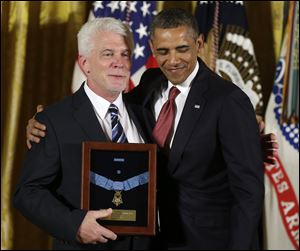
Chaplain’s heroism
4/15/2013
Ray Kapaun accepts the Medal of Honor given posthumously to his uncle, U.S. Army Chaplain Emil Kapaun, by President Obama in Washington last week.
War can be a bitter, hellish affair. But sometimes, a brave individual will rise above the fray to do something extraordinarily noble.
Such was the feat of the man whom President Obama bestowed with the nation’s highest military decoration in a White House ceremony last week. The posthumous Medal of Honor awarded to Emil Kapaun — accepted by a nephew — was a different sort of chapter in the annals of courage.
Mr. Kapaun didn’t fire a rifle while storming a machine gun post. He didn’t perform a great feat of arms that might have merited a medal. That was not his job. Instead, he was an Army chaplain in the Korean War — a Catholic priest from Kansas — who saved the lives of American soldiers by his courage.
Oblivious to his own safety in the midst of battle, he defied enemy fire and dragged wounded Americans to shelter. Mr. Kapaun chose to remain on the battlefield instead of evacuating when Communist forces overran it.
He negotiated with a Chinese officer the safe surrender of otherwise doomed Americans who had been wounded. He personally saved a wounded comrade from execution by pushing aside an astonished enemy soldier — and then carried the wounded man for miles.
These actions were the basis for the long-overdue Medal of Honor. But that wasn’t all: As a prisoner of war, Mr. Kapaun was both an inspiration to others and a practical help.
He tended to the wounded and suffering. He offered his clothes to freezing men. He eluded guards and scavenged in the countryside for food for his starving comrades. Persecuted for his religious faith, he still celebrated an Easter Mass that rallied the spirits of the prisoners.
As President Obama said, he was “an American soldier who didn’t fire a gun but who wielded the mightiest weapon of all, a love for his brothers so pure that he was willing to die so that they might live.”
In the end, his captors left him to die from dysentery and pneumonia in a prisoner of war camp. His comrades never forgot his sacrifice over 62 years until finally justice was done. Now some are working to have him declared a saint by the Catholic Church.
War is hell. But Emil Kapaun’s courageous faith and selfless humanity made it less so.